|
32 Westbere Lane
Westbere
01227 710501
http://www.yewtreewestbere.co.uk/
https://whatpub.com/olde-yew-tree
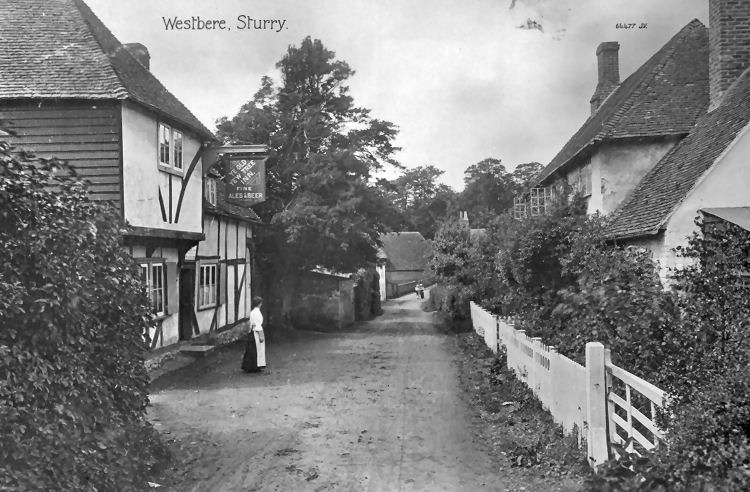
Above postcard, circa 1900, kindly sent by Rory Kehoe. |

Above postcard, circa 1900, kindly sent by Rory Kehoe. |

Above postcard, circa 1900, kindly sent by Rory Kehoe. |
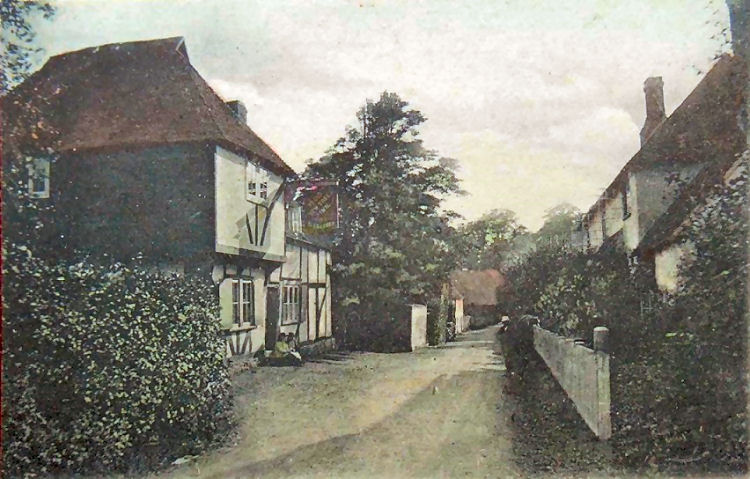
Above postcard, circa 1906, kindly sent by Rory Kehoe. |
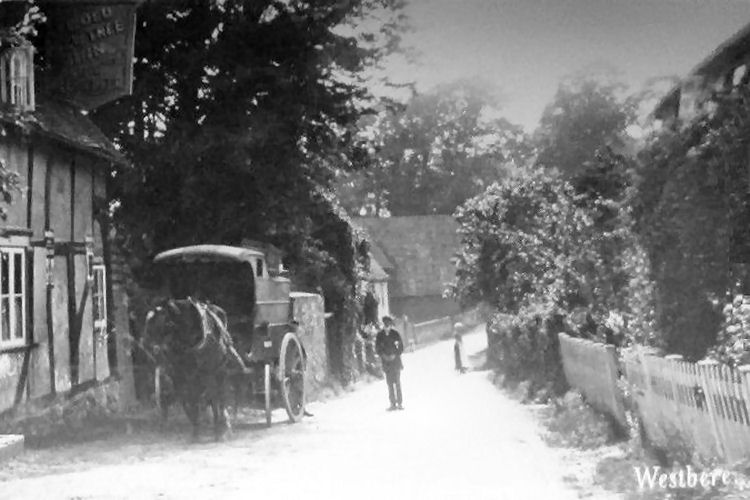
Above postcard, circa 1912, kindly sent by Rory Kehoe. |
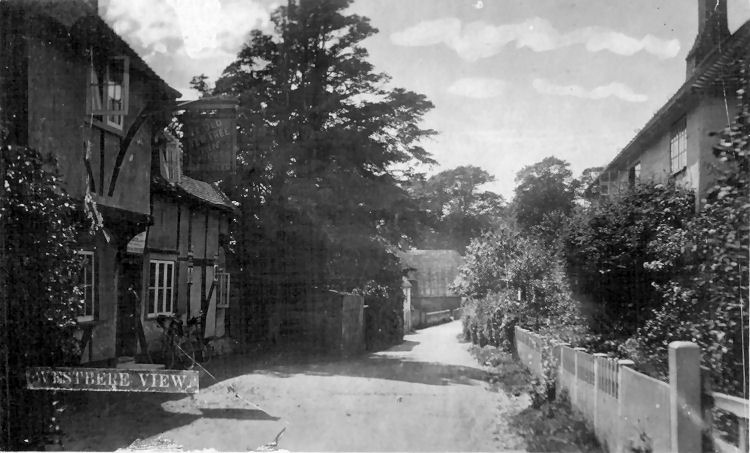
Above postcard, 1914, kindly sent by Mark Jennings. |
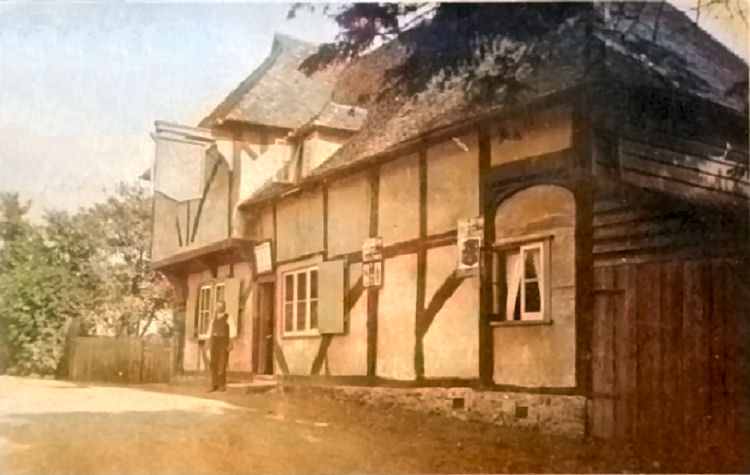
Above postcard, circa 1917, kindly sent by Rory Kehoe. Probably
showing licensee Robert Miles. |
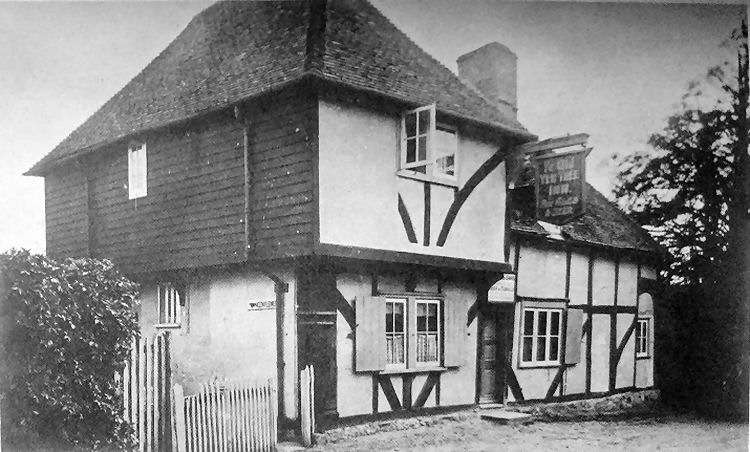
Above photo circa 1923, kindly sent by Rory Kehoe. |
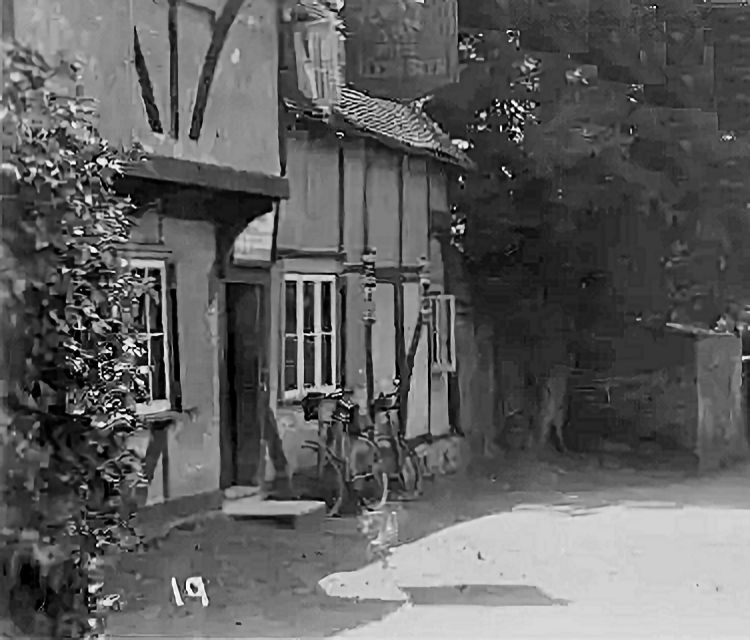
Above photo, 1927. Kindly sent by Rory Kehoe. |
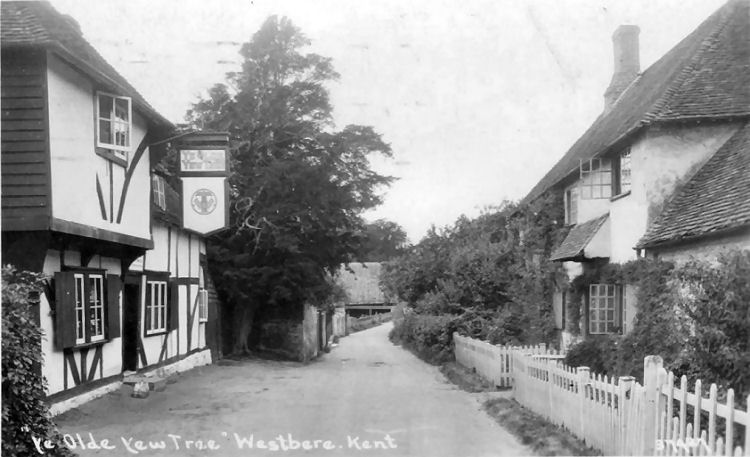
Above postcard, circa 1948, kindly sent by Rory Kehoe. |
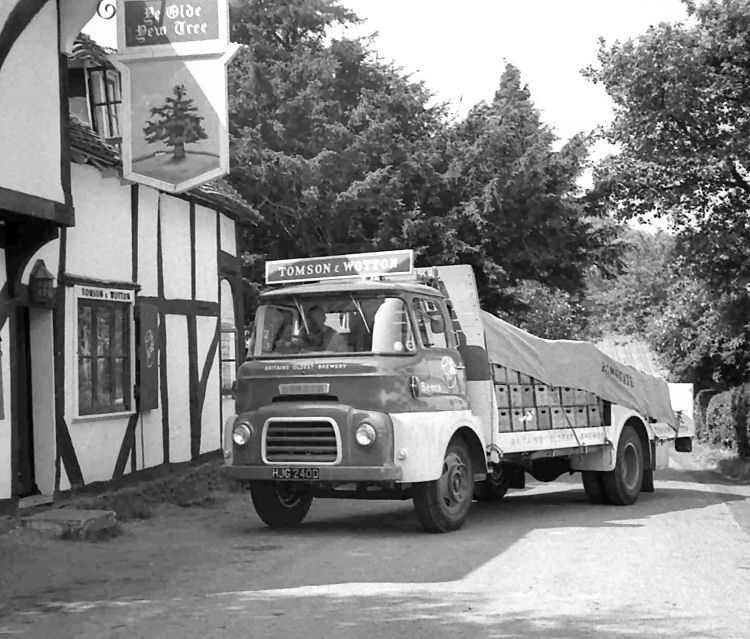
Above photo, May 1966, kindly sent by Bob Le-Roi. |
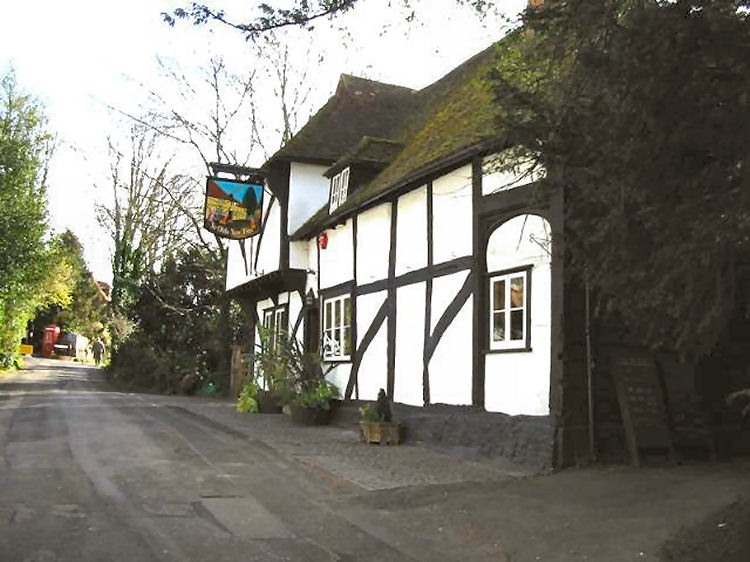
Above photo 2007 by Nick Smith
Creative Commons Licence. |
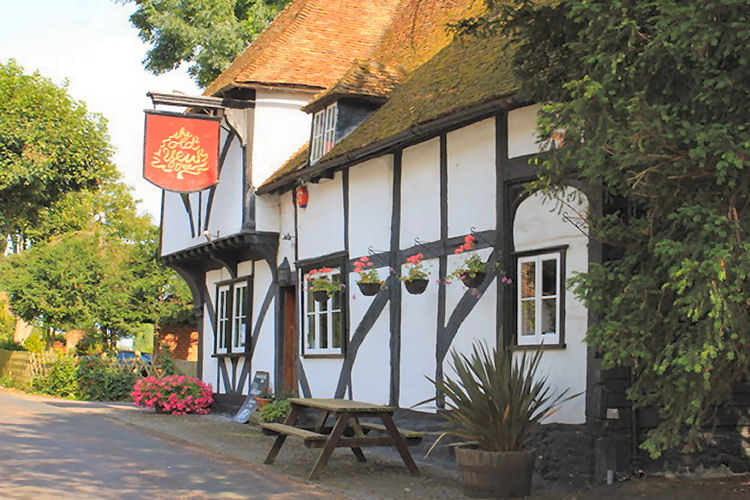
Above photo 2015. |
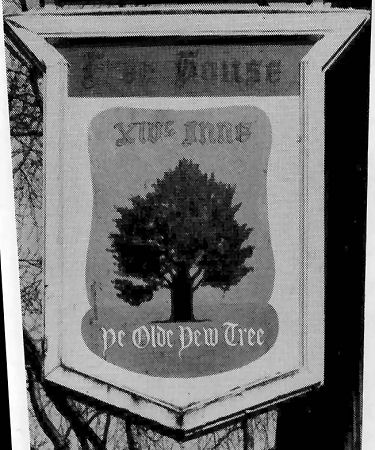 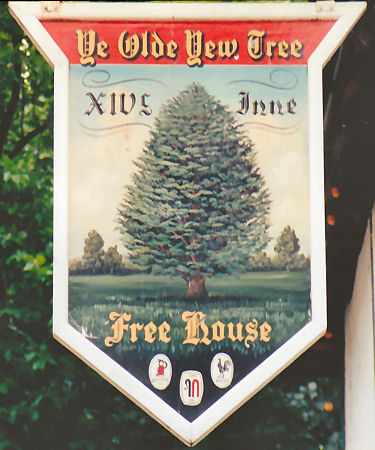 Above sign left 1987. Sign right,
July 1991.
With thanks from Brian Curtis
www.innsignsociety.com.
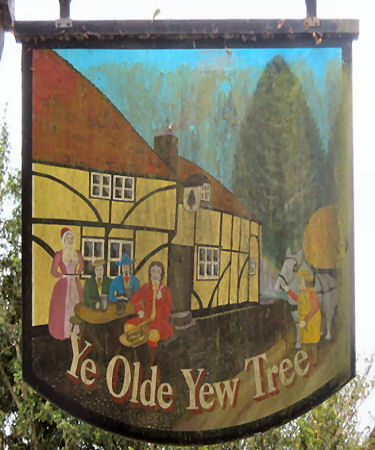 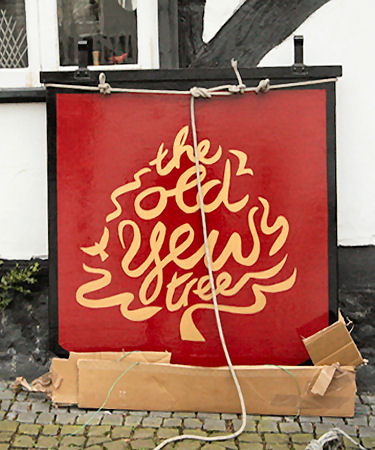
Above sign left 2014, sign right 2015.
|
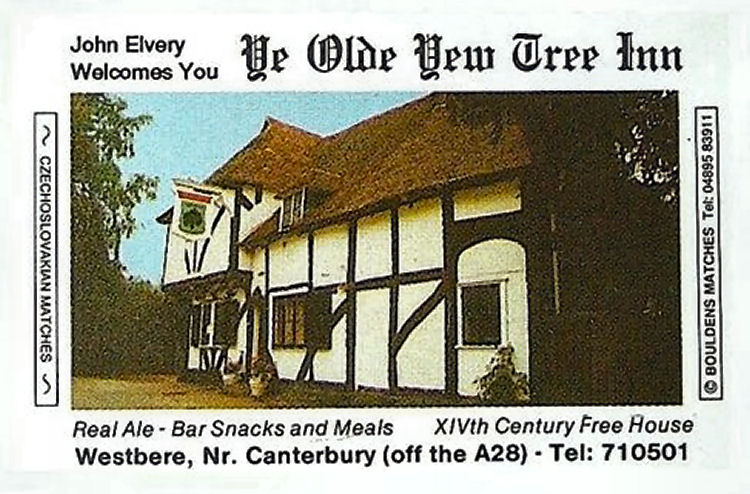
Above matchbox, circa 1987, kindly sent by Rory Kehoe. |
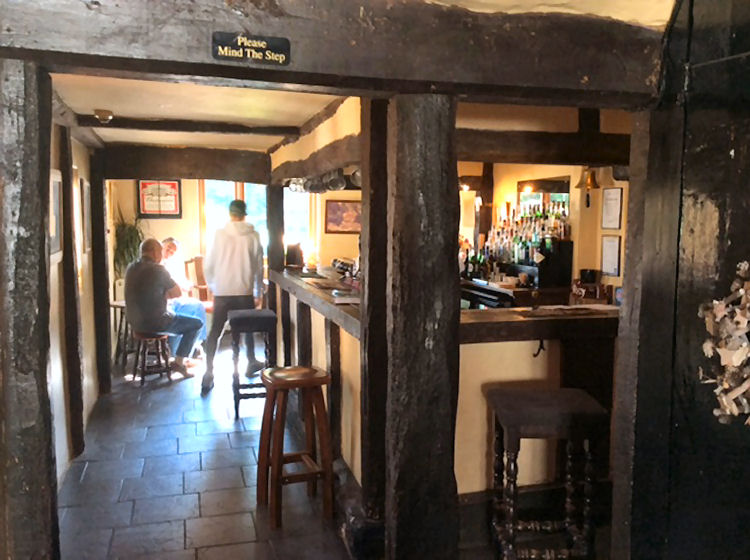
Above photo kindly taken and sent by Steve Glover, September 2017. |
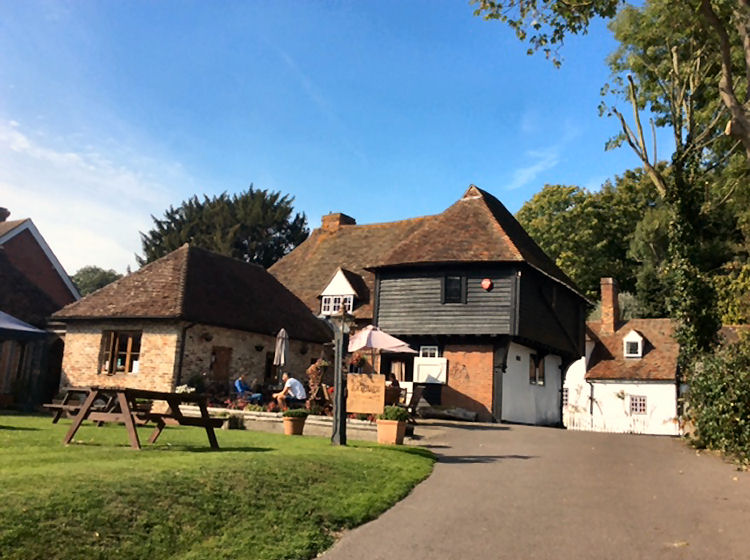
Above photo kindly taken and sent by Steve Glover, September 2017. |
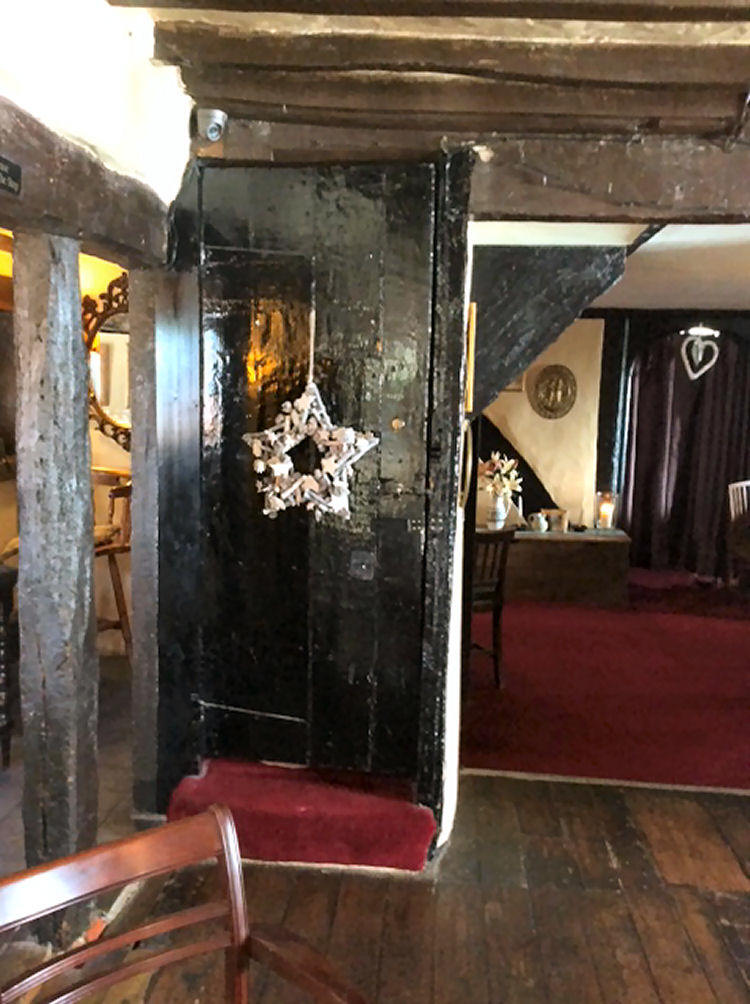
Above photo kindly taken and sent by Steve Glover, September 2017. |
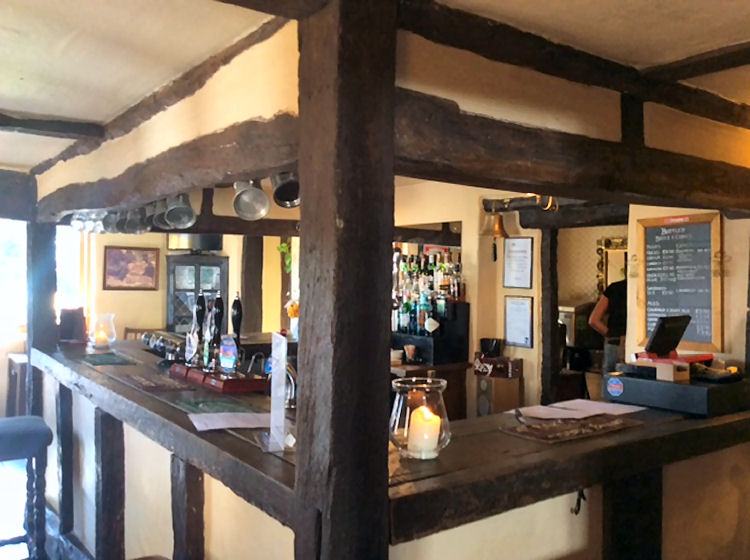
Above photo kindly taken and sent by Steve Glover, September 2017. |
The "Yew Tree Inn" proudly claims to be five hundred years old, but has
been a public house for but a fraction of that time. It was built as a
hall-house, now without its service rooms, and was a private dwelling a
century ago when Westbere, according to directories of the time, appears to
have had no pubs at all.
According to Wikipedia, the Inn was built in 1348 and it is one of the
oldest pubs in Kent. Queen Anne and the Archbishop of Canterbury are reputed
to have stayed here, and Dick Turpin evaded capture from the law hiding out
here. The building was used as a hospital to treat wounded soldiers during
the civil war and supposedly it has two ghosts. The interior is heavily
beamed and features a large inglenook fireplace.
Further research unearthed this passage "It is uncertain precisely when
the "Yew Tree" became an in. The consensus of the second half of the 19th
century record the various tenants as agricultural labourers and grocers who
probably sold ale. It was not until 1901 that the premises were officially
referred to as the "Yew Tree," a pub with a licensed victualler named Frank
Carey. Only two years previously, the inn was the starting point for the old
tradition of beating the bounds, Shelagh Wenhorn provides an interesting
note from the observations of parish history Francis Heath.... "The next
event which excites interest in the old, time-honoured custom of beating the
bounds, a custom that has been much neglected in the past. October 4th 1899
at 10 a.m. witness the departure of those who assembled to take part in this
important event from the "Old Yew Tree Inn," a well-known spot in the parish
of Westbere where, on Sunday and other dry times, many a refreshing draught
has been taken of its well-known Nut Brown Ale."" (Steve Glover
tells me that Thatcher's Brewery used to do a Nut Brown Ale, so perhaps this
was who supplied their beer in the early 1900s. However, Rory Kehoe disputes
this fact and says there has never been a brewery of that name in Kent.
However, Tomson & Wotton did brew a beer called Thatch Brown Ale and I think
the Yew Tree was always supplied by Tomson and Wotton. The Tomson and Wotton
connection is likely to be due to this. Or at least, it'll do till I get
corrected! I recall being told in the 1970s (by licensee Alf Burke) that the
Wotton family owned land and a large house in Westbere. Captain Bill Wotton
(the last Managing Director of Tomson and Wotton) used to call in on his two
aunts (the Misses Wotton) quite regularly and always paid the Yew Tree, Alf
& Joyce Burke a visit too.)
|
From the Whitstable Times and Herne Bay Herald. 23 March 1901. Price 1d.
KEEPING OPEN DURING PROHIBITED HOURS.
Frank Carey, landlord of the “Old Ewe Tree,” Westbere, was summoned for
keeping his house open during prohibited hours on the 4th inst. Mr E
Wotton, Ramsgate, appeared for defendant, who pleaded guilty. Corporal Charlton stated that at 10.25 on the night in question he
visited the house and in the tap room saw three men, two of whom were
drinking from glasses containing beer. He asked them if they knew the
time, but they made no reply. Defendant then came in and witness asked
him if he knew the time. He said he was very sorry but did not look at
his watch. On the table were two glasses containing beer. Before witness
entered the house he heard one of the men say he would have another
quart, but he would look outside first to see who was about. Cross-examined- There was no clock in the room. Mr. Wotton, in mitigation of the offence, said that defendant received a
postcard stating that he had been appointed an enumerator in connection
with the census, and on the strength of that he said he would stand his
customers in the bar half a gallon of beer. He declared that no beer was
paid for after closing time though undoubtedly the men were drinking
there. Defendant had been a licence holder for five years and during that time
had never been cautioned by the police. The Bench fined defendant 40s. and costs 10s. 5d. |
|
Whitstable Times and Herne Bay Herald, 05 February, 1938.
WINE AT “YEW TREE,” WESTBERE. APPLICATION TO LICENSING MAGISTRATES.
An application for a wine licence in respect of the "Yew Tree," Westbere, was granted
at the annual licensing meeting of the St.
Augustine's Division at Canterbury on Wednesday.
Mr. Stewart Daniel, making the application on behalf of Mr. Joseph B.
Taylor, said that at the present time the "Yew-Tree" was only a beer
house and had been such for a number of years. The house was reputed to
be between 600 and 700 years old. Behind the house was a garden which
was used for teas and other liquid refreshments during the summer, when
there were many visitors to the village. Through a demand for something
other than beer or minerals. Mr. Taylor had had to turn customers away.
Sometimes when a party arrived one member wanted a glass of wine and
because he could not get it the whole party went elsewhere.
"I am instructed," said Mr. Daniel, "that all ladies are not fond of
beer, and the result is that the inhabitants of the village cannot sit
in the garden at this house and give their wives wine if they desire it.
In the old days before so much use was made of motor cars an old beer
house might have been sufficient, but nowadays
there was an influx of visitors who preferred something different from
beer. At the moment there was a popular taste for sherry and Mr. Taylor
was often asked for this by people who visited the village. The house
had always been well conducted and Mr. Taylor was very popular. He (Mr.
Daniel) understood there was a feeling in the village in favour of the
granting of the application and the Parish Council was also in favour of
it.
He had had a letter from the Rector of Westbere, (Father C. V. Reeves)
in which he spoke of Mr. Taylor and his family in most glowing terms and
showed himself to be in support of the application.
Mr. Taylor, who said he had been at the house for three years and that
during the summer there were many visitors to the parish, supported the
statement by Mr. Daniel as to the demand for wine and said that local
residents were pleased to think he was making the application.
Mr. A. Auld. Brookland Cottage, Westbere, insurance agent, gave evidence
as to the demand for wine.
Mr. William Seath, Kemp Hall Farm, Westbere, said that the "Yew Tree"
was conducted as a licensed house should be, and Mr. Taylor was the best
of landlords. There were many visitors to the village in the summer and
they required a choice of wines and spirits. He was a member of the
Parish Council and when this matter was mentioned the members were much
in favour of the granting of the application.
The magistrates granted the application.
|
|
Whitstable Times and Herne Bay Herald, 21 June, 1947.
Bill Merritt, B.E.M. FORMER CHISLET MINER HONOURED.
Until recently when a fall of rock resulted in confinement to bed at the
Kent and Canterbury Hospital, 78-years-old Bill Merritt, of Hersden, and
formerly of the "Yew Tree Inn," Westbere, was the oldest underground
colliery worker in England.
On Thursday it was announced that Bill had been awarded the British
Empire Medal on the recommendation of the Minister of Fuel and Power for
“outstanding services to the coal industry.”
When the news was made public Bill, who used to work at Chislet
Colliery, was propped up against a pile of pillows in Bell Ward of the
Hospital. But he had had the news the day before in an official letter
and when he began to show the notification around he was the hero of the
hour.
Bill told a reporter during an interview "If I’d been up, you could have
knocked me down with a feather. It's a very big honour for a pitman and
of course, I'm tremendously pleased. Won't my pals at the Colliery be
surprised!"
When Mr. Bill Merritt. B.E.M., leaves his bed in the Kent and Canterbury
Hospital he will be the guest for a fortnight at the new Ramsgate luxury
hotel, the Regency.
|
|
From an email received, 27 January 2021
Bill was never a licensee or landlord of the "Yew Tree Inn." I lived
there till I was 8 years old (1947), with my parents, and grand parents,
Joseph B and Mary Taylor.
Bill Merritt lived in a shed at the back of the property. My
grandmother served him dinner in the pub kitchen each day. Any meat he
would wrap in a piece of newspaper and take it ‘home’. The shed
contained an old iron bed, a small desk and chair, and a suspicious
looking bucket in a corner. The pub, at that time, had an outdoor,
brick, flushing toilet and one other upstairs. Light in the shed was by
candle or from an old carbide lamp ‘borrowed’ from Chislet Colliery.
We moved to “Quinta”, a bungalow formerly on Church Lane, Westbere,
where my grandparents retired to one year later.
I believe George Harvey, an uncle to my cousin, became the landlord
in 1948 after Joseph Taylor.
I include an small item of interest titled "A Shilling and a Blue
Bike."
Best, Alan Hodgeson.
A Shilling and a Blue Bike.
It was a small blue bike. I was just 7 years old and too scared yet to
try and ride it sitting up on the saddle, so I sat on the flat carrier
above the rear wheel. From here my feet could easily reach the ground.
The lane outside the "Old Yew Tree Inn," located in the sleepy little
village of Westbere, County of Kent, England, where we lived with my
grandparents, was quiet and safe for a young boy to ride.
On occasion, a geezer I knew named Jim Unsworth, a regular visitor to
local pubs, would be seen in Westbere. He was a dapper little fellow who
lodged with my uncle, Bill Catterick, in the next village and liked his
beer, as did my uncle.
Unsworth’s estranged wife, Emily, lived down the end of the lane in a
railway crossing cottage. Her occasional duties were to open the long
gates across the tracks to accommodate a tractor passing over the rails
to reach marshy fields on the other side.
She also enjoyed a drink, but in moderation, and came to the "Yew Tree
Inn" several nights a week. Sometimes my grandmother, and I, would go to
the crossing cottage to visit her. I always remember the axe she kept
near the bolted back door, as she felt threatened by husband Jim, and
this gave her some sense of security.
The couple had wed in August 1945, but after he left the army in August
1946 to return home, the marriage rapidly deteriorated due mainly to his
drunken ways.
Anyway, when he would show up in our little village he usually had been
drinking. He would ask me to ride down to the crossing cottage on my
little blue bike to see if Emily was there so he could go and harass
her. Sometimes the rows and shouting from there were alarming. For this
small task I would hastily accept the brass three penny piece tip that
he would give me.
It was on my mother’s 30th birthday, February 11th, 1947, that about
3:15 PM, he arrived in quite a stupor and smelled particularly strong of
ale. I made my directed ride on the little blue bike down the lane and
back, to report that I had seen his wife carrying coal into the house.
She collected it by the tracks where it was thrown by the drivers of
passing steam locomotives who had knowledge of her situation.
This time the tip he gave me was a silver shilling and I felt thrilled
at the pay increase.
That evening I sat in the small, cozy bar of the pub in my pajamas,
being entertained by some of the cheery locals. Outside, great
snowflakes slowly fell. They were highlighted by the amber lamp over the
entrance heavy oak door, and as it opened, I turned to see who was
coming in. Heavy stamping feet and black uniforms with snow on their
helmets and shoulders announced the arrival of police sergeant Jennings
and constable Gimber. They slid onto a bench seat across from me and
started to quiz me about what I had seen that afternoon. My parents,
both with worried looks on their faces, came into the bar from our
living room as I told the officers what I knew, and what I had seen.
Eventually, the story came out that Mrs. Unsworth’s daughter, Betty, had
come home from school to find the outer door smashed in. She got no
response to her banging on an inner bolted door. She had peered through
a window. In the evening dusk could not make out too much but had a very
troubled feeling. Betty ran to Mr. Stringer’s house, her grandfather who
lived close by, and he came to investigate. As the evening grew dark, he
had shone his flashlight through a window and saw a pool of blood. Betty
peeped under his arm and said, “They are lying on the floor!” The pair
had then hurried to the village rectory to call the police. Two officers
had arrived, and they broke through the bolted door.
At the inquest, the coroner revealed what was found. It seems that
following my bicycle ride, Unsworth had waited till his wife came out
for fuel then pushed her back inside and secured the door bolt behind
him. It was reported that the room had evidence of a violent struggle.
On the floor, by the table, lay Emily Unsworth with her throat cut from
ear to ear by an open razor that the husband had kept on the kitchen
windowsill at my uncle’s house.
Sprawled across her was her estranged husband with wrists slashed and a
deep gash in his own throat to speed the process. The great pool of
blood had already begun to soak into the porous concrete floor.
Of course, our little village was greatly shocked. Emily’s
twelve-year-old daughter Betty, and her dachshund, came to live with us
for a while until her relatives made permanent arrangements for her.
During her stay, she would often entertain me by acting out like
Unsworth, drawing her hand across her throat, and with eyes rolled back,
drop onto the couch with limbs akimbo in a pretend death trance.
Time passed, and the next family to move into the crossing cottage would
throw back the rug to show the blood stain to visitors, as I told the
grizzly story.
I realized, sadly, that I had lost my silver shilling somewhere. By now
though, my ego was comforted by the fact that I could pedal the little
blue bike proudly down the lane seated high on the saddle.
Alan Hodgson. Port Charlotte, Florida. June 1st, 2018.
|
|
Thanet Times, Tuesday 29 April 1969.
A MAN SERVING a sentence at Canterbury Prison told Margate Court on
Wednesday that money found on him by police after a robbery from
Dreamland was his savings.
Edward Alexander Farr, who was convicted of stealing £554 from a safe at
Dreamland last year, was claiming the £77 taken from him by police at
the time as his own money.
The other claimant who appeared at the court, was Mr. Anthony Burke, of
"Ye Olde Yew Tree Inn,"
Westbere, Canterbury, who said that he was part time manager of the
arcade and was responsible for the money which was stolen in the raid.
Det. Sgt Sidney Vickers told the court that he saw Farr in connection
with the robbery, and though Farr said he only had 13s in money,
officers found a roll of £77 tucked inside his underpants.
'SAVINGS'
Farr claimed that he was wearing swimming trunks and had put the money
inside them to keep it safe. The money, he said, had been saved over a
course of time working in London and in Thanet.
The magistrates decided to accept the application of Mr. Burke, that the
money was his and ordered him to pay, pointing out to Farr that he had
14 days to lodge an appeal.
|
According to a village history pamphlet, the building was a grocery shop
in the early part of the 19th century and the owner, Thomas Marsh, may have
taken advantage of the Beerhouse Act of 1830 in order to obtain an on
licence. Until the change of use in the mid-19th century, the building had
been known as the "Palm Tree." Palm is an old Kentish dialect word for yew.
In 1834 the villagers met at the "Palm Tree" for a Bread & Cheese charity
feast.
I am informed by Mark Hatcher that Robert Bert Miles was still the
publican in 1921. His wife died in 1922, so assume he sold up, and he has
found him registered in Redcar cemetery, North Yorkshire in 1931. But
doesn't know the link to that are is as yet.
Renovations in 1982 saw the three bars opened up into one, and
unfortunately the wooden panelling went out with the walls and also the
character of the pub.
It is reported the licensee Alf Burke was no mean accordionist and
occasionally entertained, with his encore always being to sing "the hole in
the elephant's bottom."
Project 2014 has been started to try and identify all the pubs that are
and have ever been open in Kent. I have just added this pub to that list but
your help is definitely needed regarding it's history.
As the information is found or sent to me, including photographs, it will
be shown here.
Thanks for your co-operation.
LICENSEE LIST
CAREY Frank 1901+

BRICE Marshall 1911-July/1913 (labourer on farm age 52 in 1911 ) )

MILES Robert Bert July/1913-21+ (age 59 in 1921 ) )

DAVIES Joseph F 1923+
TAYLOR Joseph B 1935-48
HARVEY George 1948-62
BURKE Alf (Anthony) & Joyce 1962-82
ASHCROFT Ray & Grace 1984-87
ELVERY John 1987+
 Census Census
 Whitstable Times
and Herne Bay Herald Whitstable Times
and Herne Bay Herald
|





















